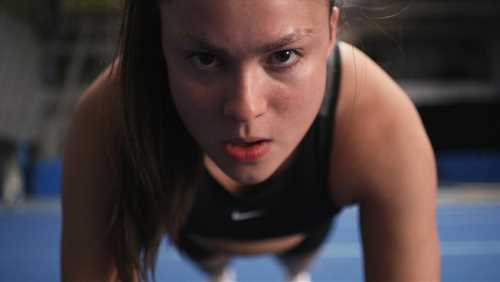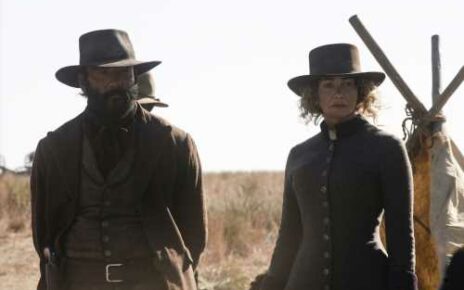For years, D.W. Waterson’s go-to performance look for their DJ sets was a purple cheerleading uniform.
“For some reason, it just really gets the audience going,” Waterson tells Variety. “Cheerleaders are hype men — they’re the best people to get people excited.”
Waterson didn’t know too much about cheer itself, but they found that wearing the outfit — combined with growing up in a sports-heavy household — made them want to dive deeper into the world of cheer. “There’s a sense of cheerleaders being misrepresented that made me really curious,” Waterson says.
After creating and directing the award-winning web series “That’s My DJ,” Waterson had been searching for the right story for their feature-length debut — and found that there was a rather large gap in the oeuvre of films about cheerleading.
“Seeing what’s expected from these young girls when you’re throwing bodies super high in the air and catching them — and the concussion rate for cheerleading is one of the highest of all sports, like above football — so I’m like, ‘Why aren’t we talking about this?’” Waterson says. “I’ve seen so many gritty male sports films in my life, but where are the gritty female sport films or the gritty queer sports films?”
“Backspot,” premiering Sept. 8 in Toronto International Film Festival’s Discovery program, happens to be both. The drama follows Riley, a driven cheerleader (“Reservation Dogs” star Devery Jacobs), who struggles to handle the pressure when she and her girlfriend, Amanda (newcomer Kudakwashe Rutendo), are both selected for an elite cheer squad. Evan Rachel Wood features as their intensely critical coach, Eileen. Jacobs is also a producer on the project, and Elliot Page executive produces through his Page Boy Productions.
Waterson first started work on the film five years ago, when they began researching the sport by shadowing competitive team Cheer Fusion All Stars in Brampton, just outside of Toronto. The only Black-owned cheer gym in Canada, Waterson, Jacobs and writer Joanne Sarazen observed the squad in practices and at competitions to make sure the script and characters were as authentic as possible. It also helped that Jacobs is a former competitive gymnast, and Rutendo was the cheer captain at her high school — both of whom did most of their own stunts. The rest of the cast was pulled straight from local cheer squads.
“The one big takeaway was cheer is crazy, and concussions and injuries are an everyday thing. And the second takeaway is young women are so silly,” Waterson says of their research. “Like as soon as they weren’t practicing, they were running around screaming, letting their inhibitions go. Also, the amount athletes eat, I don’t understand why we haven’t seen cheerleaders pound food, so that was another thing that I wanted to make sure was in the film. They’re crushing burgers and onion rings and then they’re gonna go flip, to because that’s what teenagers do.”
That youthful innocence is also present in Riley and Amanda’s relationship, who share kisses in between practices and sing along to Broadway soundtracks in the car. “We wanted to keep it kind of pure in that way, like best friends that are dating. There’s just so much happiness in Amanda and Riley’s relationship,” they say. “Obviously, they have tension and they go through what they go through in the film, but I really fought to have a positive queer relationship.”
Waterson continues, “In writing you need conflict, and so when you see queer films, it’s ‘OK, this person’s coming out.’ That’s the conflict — their queerness. Or this person’s dating this other person and they’re both queer, but it’s this person’s first time or whatever. I really wanted to move the conflict off of the queer relationship.”
However, the fact that a queer film about cheerleading exists is not something to overlook. “There’s ‘But I’m a Cheerleader,’ but that’s just the title, you know?” Waterson says. “There’s been so much going on in pop culture with queer bodies in sports, specifically trans bodies in sports. There’s so much debate over that, and I feel like just queer people being involved in sports has been such a touchy subject. This is the medium I wanted to explore those conversations in. And also, it’s not at the forefront. Them being queer isn’t the problem, you know? It’s the performance, it’s the sport, it’s the attitude, it’s the expectation that’s the issue — it has nothing to do with them being queer.”
“Backspot” shows the grueling side of competitive cheerleading — it’s not all glitter and hair bows, but constant bruises, death-defying stunts and mental blocks. One particular montage, appropriately set to “Thunder” by The Prodigy, sees the cheerleaders “beat their bodies into oblivion,” as Waterson puts it.
“I named the team the Thunder Hawks specifically in hopes that I’d be able to get Prodigy,” they say. “So I cut together a little video for them, just from Gatorade commercials and different cheer things to be like, ‘I’m portraying cheer like a gritty football movie.’”
The importance of mental health in sports is also explored through Riley’s struggles with trichotillomania, a hair-pulling disorder that causes her to rip hairs from her eyebrows.
“People don’t even know that they’re doing this, that nervous kind of twitch, or it’s pulling a scab or a fingernail. These are all just little things of how stress and anxiety can take form on our bodies,” Waterson says. “We’re having these big impact moments with throwing bodies in the air and big bruises and catching and flipping, but it’s all the way down into these intimate details of pulling hair out because the stress and anxiety is too much.”
A major factor in Riley’s stress is her hard-ass cheer coach, Eileen, played masterfully by Evan Rachel Wood. The “Westworld” actor was at the top of Waterson’s “dream list” for the part, and with the help of Page Boy, she signed on.
“She knew exactly what she wanted to do and was also open to my direction and just seeing all the crevices we could find within Eileen,” Waterson says. “She did an outstanding job. Obviously, I’m biased, but it’s one of my favorite performances now from her work.”
Working with Page and his production company — who found out about the film because he’s a fan of Jacobs’ performance in “Reservation Dogs” — was game-changing for “Backspot.”
“Just having a queer production company, as a queer artist, be there and be shepherding you through all of these new experiences has been so instrumental in creating a fantastic film,” Waterson says.
As “Backspot” premieres out of TIFF, Waterson hopes it can help change the narrative on how cheerleading is perceived — both on screen and in the real world.
“I hope people will take cheer seriously and see the blood, sweat and tears that go into this sport and see how challenging it is,” they say. “I also hope people take away that young people may not know how to express themselves, but there’s a lot going on inside of them. And maybe for people to just reach out more and open those conversations about mental health.”
Watch an exclusive clip from “Backspot” above.
Read More About:
Source: Read Full Article


